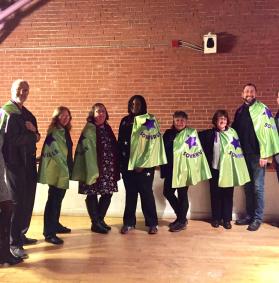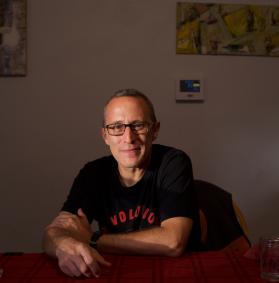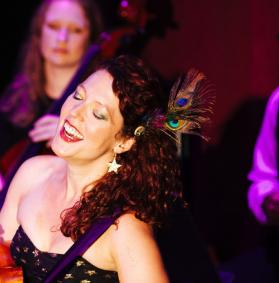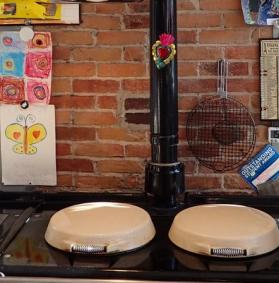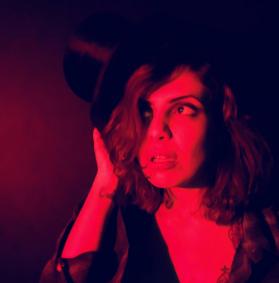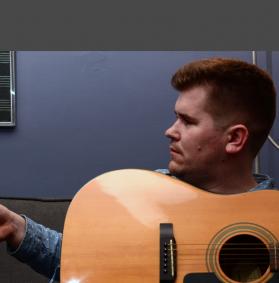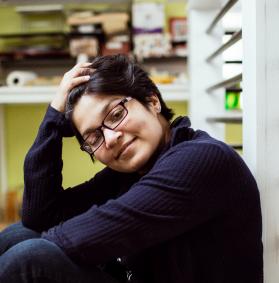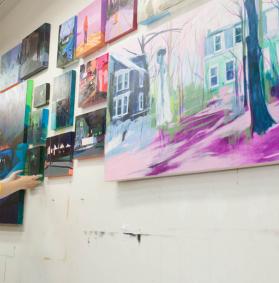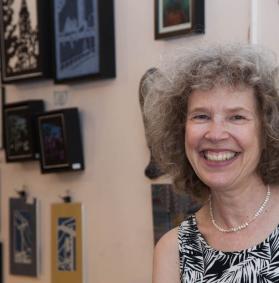An interview with Jon Bernhardt as told to board member Matt Kaliner. Photos by Matt as well.
Jon Bernhardt has been a Thereminist, DJ, actuary and resident of Somerville since 1996. Find out more on his website, follow him here, or visit him during Porchfest.
Tell us about the Theremin - do you remember the first time you saw one?
It’s funny: I saw one in a band in the early 90s, and it really made no impression because the player was just using it for an effect and I didn’t quite understand what was going on. A few years later, about 1996, I saw this documentary at the Coolidge, Theremin: An Electronic Odyssey. It was a fascinating documentary about the inventor, his life, and the instrument. They had a demonstration afterwards. I asked how do you do you get one of those things and was told you can get them online from Moog. So I got one. That coincided with when I moved to Somerville. That summer we had a barbeque for the new house, and a friend mentioned that he also just bought a Theremin. We were joking: we should form a Theremin orchestra. A few months later, this potential gig presented itself to us, and so we decided to go for it. That became the Lothars, my first band.
This was your first band? Were you musically inclined before this?
I’d dabbled, on guitar and keyboards, but I hadn’t really found my instrument. Or my instrument hadn’t found me. We found each other when I met the Theremin.
What about the instrument attracted you?
It’s just cool instrument. You play it without touching it. There’s really nothing else like it. It appeals to the nerd in me. I like the fact that a lot of people build their own Theremins. The first Theremin I had, I built from a kit. The circuit board was already pre-assembled so it wasn’t terribly difficult, but it required a little soldering here and there and woodworking for the cabinet.
Where does the Theremin technology come from?
It was invented in 1919, so it’s almost a hundred years old. It was the first electronic instrument, so it predates electronic synthesizers and any other instrument that uses electronics to generate sound.
How would you describe how you play?
The repertoire that I choose is rather unique. There’s not too many other people who play the Clash on the Theremin. Technically, it’s a box with two antennae. One points straight up, like a radio antenna. That controls the pitch, so as your hand gets closer or further away, the pitch gets higher or lower. Then there’s another antenna on the other side that is typically a loop. That controls the volume. As your hand moves way, the sound gets louder, and as your hand gets closer or touches it, there’s no sound.
How did you learn to play?
When I bought that first one, it came with a video with some “lessons” included, but I’m mostly self-taught, learning from watching other people play. When I started, there was a rising interest in the Theremin probably because of the documentary, and I went to several Theremin conventions and workshops, where I met other players and went to master classes in Asheville, North Carolina. I really got into it. I formed the band, we did some recording, and we toured a little bit.
How did you develop your stage presence?
The thing about the Theremin is that it’s so sensitive to your movements. If you wiggle your finger a little bit, you’re changing the pitch, audibly. You really have to stay perfectly still. So, why not play that up? That’s why I do that whole statue thing. When I was on America’s Got Talent, I think a big thing the judges liked was this contrast between staying perfectly still and just going nuts on the crazy solo. There’s a comedy aspect to the performance, also in the repertoire of songs.
How often do you learn new songs?
Not as often as I would like. I did just learn a new one, for a performance in Harvard MA, for a group that does a live radio play. This was their tenth anniversary, and they did The Day the Earth Stood Stilland thought it would be fun to have someone on Theremin doing some of the music and effects and play a few songs during intermission. So I learned Space Oddityby David Bowie. I was trying to think of something spacey. There was talk of Starman, but songs work better for Theremin if the melody slides up and down more. You really have to think about the song, and sometimes you don’t even know until you listen with that intent. Starmanis too jumpy.
What’s your process for learning to play a song on Theremin?
Typically I just use a karaoke track. The way I start off is that the Theremin is the vocals. I start with that, and then later figure out if there are effects I can add, like the guitar solo in the Clash, or spacey sounds like you have in Space Oddity. But I start with the idea that the Theremin is the vocals.
What’s your favorite song to play?
There’s two. Video Killed the Radio Staris just a really cool arrangement and fun to do. The Clash’s Should I Stay I Should I Gois a great set ender. The crowd loves the crazy solo. That’s the one I played for America’s Got Talent. I usually play 8 songs in a thirty minute set.
How else are you involved in the local scene?
I have been doing radio since college. I graduated from MIT in 1986, and started at WMBR a couple years before that. I’m one of those people who have never left the radio station. So, I’ve been involved in the music scene on that level, going to shows, being a DJ.
Tell us more about working at WMBR?
I started as a student. WMBR is always trying to get more students involved. When I started there, there were almost no students at all. Since then, WMBR has been about fifty-fifty, students and non-student. We are all volunteers; we’re rather proud of that fact. Even the people who fix equipment. I DJ once a week, every Friday morning, Breakfast of Champions, 8-10 AM. At the end of June, I’ll have been on that show for thirty-four years. I think about my music selections all during the week. But it’s really the day before, that I hunker down and plan it all out. I try to play about half new releases, from the last six months, and half older stuff.
You wear a lot of different hats around here - Thereminist, DJ, what else?
Well, there’s thing that I actually do for a living. None of these other things make me much money. The DJing is volunteer. For money, I’m an actuary. I’ve been doing that since I graduated from college. I studied math. Typically an actuary is someone who does the math for insurance companies. In the olden days, actuaries would develop mortality tables. I work in the pensions area.
And you have other bands, too?
The Lothars was the main band, and a few years later, I joined this band The Pee Wee Fist. The Lothars were the experimental, all instrumental band. When we started out, it was three Theremins and a guitar, where the guitar was sort of the drummer since she grounded us. We could sort of play around the guitar lines. The Pee Wee Fist was a more traditional indie pop band. I couldn’t play Theremin in every song, so I would play a little keyboard and percussion. I guested with another band called UV Protection a few times.
How do you balance all of this with your family life?
Yeah, since I’ve become a father, I’ve had to cut back on live performances and practicing. I’m also missing more radio shows when my wife is out of town or sick and I need to bring my son to school. I do need to turn down some gigs, and I don’t hustle quite like I used to.
Tell us the story of your America’s Got Talent audition.
Back in 2011 they got in touch with me and invited me to an audition. They found me on Youtube. I wasn’t interested in doing the cattle call, but they were doing a day of scheduled auditions. I did the audition in front of some producers, and they lead you on “we really like you, we’re going to get you to New York to play in front of the judges”, then at the last minute you never hear from them. That’s just how it works - and that was fine. And then five years later, I get an email again from a producer inviting me. This year the audition was in New York, and I couldn’t go, so they just used my Youtube stuff. I actually got to audition in front of the judges without any preliminary auditions! It was touch and go for a while. I had plane tickets, and then they canceled them, and then they moved me to a different date. It wasn’t until a few days before that I knew for sure it was going to happen.
I went into it with no expectations. I know that what I do is a silly gimmick, playing “Should I Stay or Should I Go?” It’s a pretty hellish day – I was there 11 or 12 hours before going on, and the food was awful. They record some B-roll with you, your reactions and conversations with other contestants. There were thirty or forty auditions that day. The thing about that show is that they want a story, more than a performance. My story was, “Actuary by day, crazy musician by night.” That’s what they played up. They weren’t interested in my radio show, since that didn’t fit the narrative. I was fine with all of this. I could enjoy the experience without being too stressed out.
You seemed very comfortable during your performance.
I was surprised when I got on stage by how not-nervous I was. I was able to talk to the judges without shaking too much. Part of that was that I wasn’t some seventeen year old kid looking for a break. I really did not expect to get through the first round. But I actually got through the first round. Then, things fell apart when I hit the stage in the second round.
What was it like to compete with the other contestants?
Socially, there was a real camaraderie. You’re all doing such different things, that it doesn’t feel like you’re in competition with each other. In the end you are, but in these early rounds, multiple people are making it to the next round. The judges are either going to like me, or a juggler, but we’re not really competing with each other. I can imagine that other shows like The Voiceare more cut throat because you’re all doing the same thing.
I was really impressed by everyone on the crew. You can tell that they are working so hard to get the best show. They are always trying to think of things they could do with me, to make my story more interesting, and shots they could do. I was really impressed by their professionalism and creativity.
The second round was kind of a disaster, but they made it look even worse. I kind of knew that going in, that if they like you, they’re going to make you look as good as they can. And if things go bad, they are going to try to go the other way, because those extremes are good for the narrative. For the second round, I felt like I was on borrowed time anyway.
Porchfest is coming up – anything new? What are your thoughts on the festival?
Space Oddityis the only new song. I think Porchfest is great. It’s weird that I don’t get to enjoy it from a spectator’s perspective, but it’s always a good audience. There’s the people who have seen me before, and the people who haven’t and need some explanation. I’m always pleasantly surprised by the crowds, and how long they stay. And I like the fact that the Arts Council has used it as a way to raise funds for a cause.
You play on Charnwood Road which has become very crowded during Porchfest.
It’s funny: for years, it was just me and the Charnwood Pickers. The two of us have been doing it pretty regularly almost since the beginning. They play way up the other end of the street so there’s no conflict. Last year there were people who played on the next porch over, and we had to adjust our schedules. This year, I‘ve discovered that, not next door, but two houses up, on both sides of the street, there are bands signed up. I think we’ll all just have to cut back on our volume.
The proliferation of bands on Charnwood might be like the Illuminations Tour, where one house puts up really great lights, and other houses on the block are inspired to join in on the action.
In fact, I didn’t do it the first couple of years. My downstairs neighbor did an early Porchfest, playing cello. When she moved out, I was inspired to do it myself.
